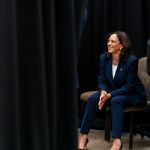Kamala Harris seems to have underestimated American voters’ understanding of tariffs, once again showcasing her penchant for misrepresentation. During a recent CNN town hall, Harris made the dubious claim that President Trump’s tariff proposal could effectively operate as a “national sales tax of at least 20 percent on everyday goods and necessities.” This assertion not only misses the mark but also cleverly sidesteps the word “tariff” altogether, as if by avoiding the term she can somehow conjure some sort of acceptance among a skeptical public.
Yet, the reality is far from the narrative Harris attempts to spin. Voters across the nation appear to have a much clearer grasp of the subject matter than she gives them credit for. A recent CNBC All-America Economic Survey reveals a stunning 54 percent of Americans trust Trump more on tariff issues, compared to a mere 32 percent who believe Harris would be effective. It seems the public has found comfort in Trump’s straightforward approach to international trade, which stands in stark contrast to Harris’s confusing label games.
Trump Is Trouncing Harris on Tariffs https://t.co/vI2jfmQkxG via @BreitbartNews
— John Carney (@carney) October 24, 2024
Polling from Reuters/Ipsos sent shockwaves through Democrat ranks last month as it found that a commanding 56 percent of voters actually support Trump’s tariff initiative. Meanwhile, an ABC News/Ipsos poll from last week uncovered even more telling insights, showing that 57 percent of voters believe raising tariffs is the way to go, with 19 percent expressing strong support for this approach. With such overwhelming opposition to Harris’s stance, one has to wonder how long Democrats plan to ignore the voices of the electorate.
While some may argue that Harris’s dismissal of tariffs represents a broader trend in the Democrat party’s stance on trade, it seems that voters aren’t buying into the rhetoric any longer. Instead of addressing the concerns of everyday Americans regarding jobs and economic security, Harris continues to present a narrative that sounds more like a poorly rehearsed sales pitch than a legitimate economic strategy. The disconnect between Democratic leadership and the voters is becoming markedly apparent, and Harris’s inability to articulate a sensible policy is only exacerbating the situation.
In a political landscape where trust and accountability reign supreme, Harris’s latest missteps may just be the ripe fruit of a party out of touch with the struggles and concerns of everyday Americans. It is clear that as long as she continues to miscast tariffs in a negative light without offering viable alternatives, she risks alienating an electorate that is increasingly looking towards understanding and supporting policies that bolster American economic strength.




